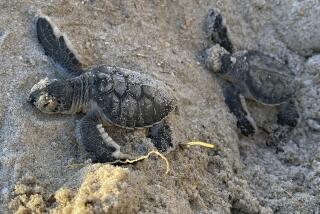Developments in Brief : Researchers Sniff Out Answers in Attempting to Save the Sea Turtles
- Share via
Biologists have long surmised that sea turtles rely on their powerful sense of smell to find their way back to the exact strip of beach on which they were born years earlier. New research suggests that biologists are right, and that may mean good news for the endangered turtles.
For the first time, scientists have confirmed in a laboratory experiment that such infant turtles do imprint certain smells and that they return to areas with those smells as often as possible.
All eight species of giant sea turtles are endangered partly because they continue to return to their birthplaces, even though many of those beaches have become populated, polluted or destroyed.
Ecologists, trying to save the sea turtles, have established an international program in which baby sea turtles are removed from their natural hatching sites and placed on protected beaches on Texas islands. The hope is that such babies will imprint smells of the new beaches and then return to them when they reach adulthood, a process that takes 15 years, according to David Owens, a biology professor at Texas A&M; University.
In his experiments, Owens exposed hundreds of baby sea turtles in their laboratory to chemicals not found in nature that have distinctive smells. As the babies matured, they were placed in a large tank that had “nests” of different chemicals, Owens said. And they repeatedly returned only to the nests that contained chemicals they had been exposed to shortly after birth.
More to Read
Sign up for Essential California
The most important California stories and recommendations in your inbox every morning.
You may occasionally receive promotional content from the Los Angeles Times.













